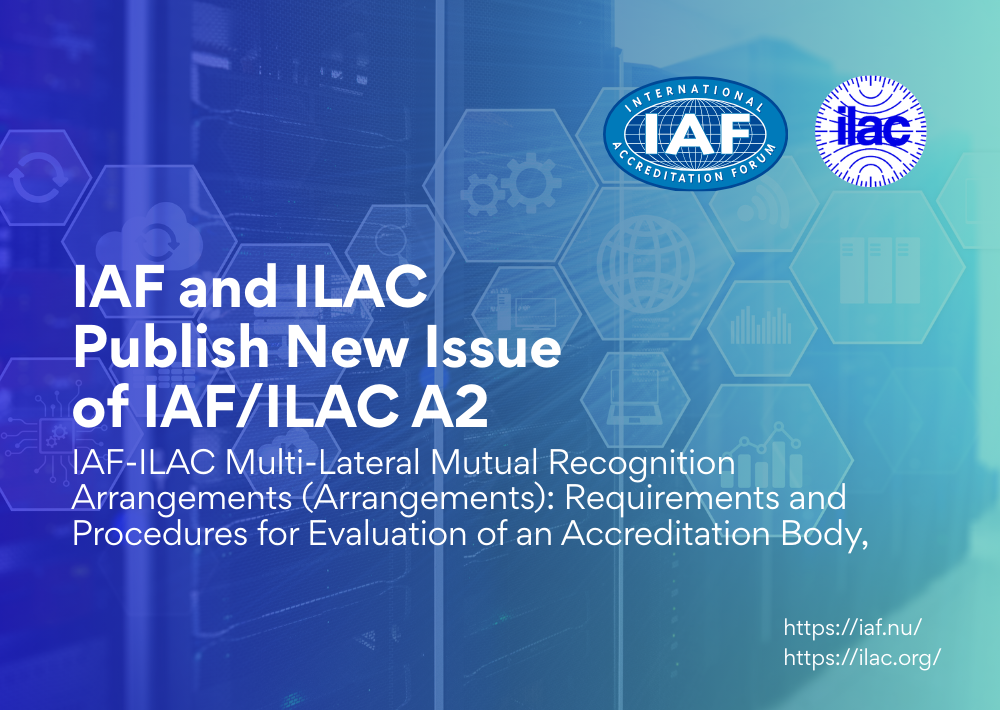
The International Society of Organoid Research (ISoOR), Singapore, is welcomed as a Stakeholder member of ILAC.
We welcome ISoOR and look forward to working with our ISoOR colleagues.

IAF and ILAC have published a new issue of IAF/ILAC A2: IAF-ILAC Multi-Lateral Mutual Recognition Arrangements (Arrangements): Requirements and Procedures for Evaluation of an Accreditation Body, which introduces updates aimed at strengthening the evaluation process for accreditation bodies.
The document continues to serve as the reference for Regional Accreditation Groups, ILAC and IAF for evaluating single accreditation bodies for the purpose of signing applicable mutual recognition arrangements. These organisations are required to follow the specified requirements and implement procedures in alignment with IAF/ILAC A2.
The new issue includes a number of key changes:
These revisions aim to improve consistency, adaptability and technical depth in the evaluation of single accreditation bodies, supporting the continued credibility and reliability of the global and regional mutual recognition arrangements.
View the document here

We welcome Azerbaijan Accreditation Centre (AzAK), Azerbaijan, as a Full Member of ILAC.
AzAK joined ILAC as an Affiliate member on 5 October 2012 and then Associate member on 2 March 2018. As AzAK is a signatory to the APAC MRA for the accreditation of calibration and testing laboratories using ISO/IEC 17025, AzAK has also been granted signatory status to the ILAC MRA and therefore, Full membership of ILAC.
We welcome AzAK as a Full Member and look forward to working with our AzAK colleagues.
The full list of signatories to the ILAC MRA is available here.

The signatory status of Organismo Uruguayo de Acreditación (OUA), Uruguay, to the ILAC MRA has been extended to include the accreditation of Inspection (ISO/IEC 17020).
The full list of signatories to the ILAC MRA is available from https://ilac.org/signatory-search/ .

We welcome Icelandic Service for Accreditation (ISAC), Iceland, as a Full Member of ILAC.
As ISAC is a signatory to the EA MLA for the accreditation of inspection bodies using ISO/IEC 17020, ISAC has been granted signatory status to the ILAC MRA and therefore, Full membership of ILAC.
We welcome ISAC and look forward to working with our ISAC colleagues.
The full list of signatories to the ILAC MRA is available here.

The signatory status of Vietnam Institute of Accreditation (VACI), Vietnam, to the ILAC MRA has been extended to include the accreditation of Medical Testing (ISO 15189) and Inspection (ISO/IEC 17020).
The full list of signatories to the ILAC MRA is available from https://ilac.org/signatory-search/ .

The Grain and Feed Trade Association (Gafta), United, Kingdom, is welcomed as a Stakeholder member of ILAC.
We welcome Gafta and look forward to working with our Gafta colleagues.

07 July, 2025
The International Laboratory Accreditation Cooperation (ILAC) and the Grain and Feed Trade Association (Gafta) have formalised their collaboration, recently signing a Memorandum of Understanding (MoU).
ILAC is the specialised body administering a global multilateral Mutual Recognition Arrangement among accreditation bodies responsible for accreditation of conformity assessment bodies, including testing laboratories.
Gafta is the international trade association representing companies involved in the trade of agricultural commodities, spices and general produce. Gafta seeks to promote free trade of agricultural commodities, to encourage an open, predictable trade environment to avoid trade disruption, to promote international standards based on sound science to facilitate trade; and to raise awareness of the instrumental role played by the international trade in transporting safe, sustainable, nutritious and affordable food and feed from areas of surplus to areas of deficit to feed a growing world population and ensure global food security.
ILAC and Gafta have been cooperating since 2021 and have collaborated on the communication of the requirements of Gafta for the inspection of agricultural commodities, general produce, and spices for international trade. Gafta operates a scheme for superintendents and a scheme for analysts that recognise ILAC member accredited inspection bodies and test laboratories within those schemes. You can view and download the MoU here.
Further information on Gafta and its activities is available at: https://www.gafta.com/

World Accreditation Day (WAD), a global initiative established by IAF and ILAC, is celebrated annually on 09 June to raise awareness of the importance of accreditation. This year, WAD focuses on the theme of Accreditation: Empowering Small and Medium Enterprises (SMEs), highlighting the critical role that accreditation plays in supporting SMEs around the world.
Supporting the Backbone of the Global Economy
SMEs are the foundation of national economies, accounting for the majority of businesses globally and serving as key drivers of employment, innovation and economic resilience. Despite their importance, SMEs frequently encounter obstacles such as limited resources, market access challenges and competitive pressures.
Accreditation provides SMEs with a vital tool to overcome these hurdles. By leveraging accredited conformity assessment services, such as certification, testing, inspection and validation/verification, SMEs can strengthen their credibility, enhance their quality assurance and gain recognition in both domestic and international markets.
Accreditation: A Strategic Advantage for SMEs
Accreditation confirms the competence, impartiality and consistency of the conformity assessment bodies that provide services to businesses. When SMEs use accredited conformity assessment services, they demonstrate compliance with recognised standards and regulatory requirements. This not only builds trust with customers and stakeholders but also opens the door to global trade through international arrangements such as the IAF Multilateral Recognition Arrangement (MLA) and the ILAC Mutual Recognition Arrangement (MRA), which enable mutual recognition of accredited conformity assessment results across borders.
The benefits for SMEs go beyond market access. Accredited conformity assessment helps minimise business risks, reducing product recalls, preventing costly rework and ensuring compliance with legal requirements. It also contributes to operational efficiencies, cost savings and continuous improvement, helping SMEs grow sustainably and stay competitive in an evolving marketplace.
Join the Celebration
IAF and ILAC have released a number of resources for WAD 2025, including a joint statement from the IAF and ILAC Chairs, a brochure and a video that can provide more information about how accreditation empowers SMEs. Additionally, a variety of case studies related to our theme are available on the Business Benefits and Public Sector Assurance websites. These case studies illustrate how SMEs from different sectors have successfully leveraged accreditation to access new markets and achieve long-term growth.
IAF and ILAC will celebrate WAD through a 45-minute virtual event, hosted in two time zones to enable international participation. We welcome all interested parties to attend at either 9:00 UTC or 17:00 UTC, by registering in advance at one of the following links:
9:00 UTC session: https://us02web.zoom.us/webinar/register/WN_8RyTTi8lTVaJi5daZ-VWrQ
17:00 UTC session: https://us02web.zoom.us/webinar/register/WN_QQi-8F48QA-o0zE2cl7nJw
Additionally, IAF and ILAC members are holding a number of events in their economies or regions. View a list of member events here.
Join the conversation online using the hashtag #WAD2025, and follow IAF (International Accreditation Forum Inc) and ILAC (International Laboratory Accreditation Co-operation (ILAC)) on LinkedIn, or IAF (@IAF_Global) and ILAC (@ILAC_Official) on X.

The signatory status of International Accreditation Service, Inc, (IAS), USA, to the ILAC MRA has been extended to include the accreditation of Proficiency Testing Providers (ISO/IEC 17043).
The full list of signatories to the ILAC MRA is available from https://ilac.org/signatory-search/ .